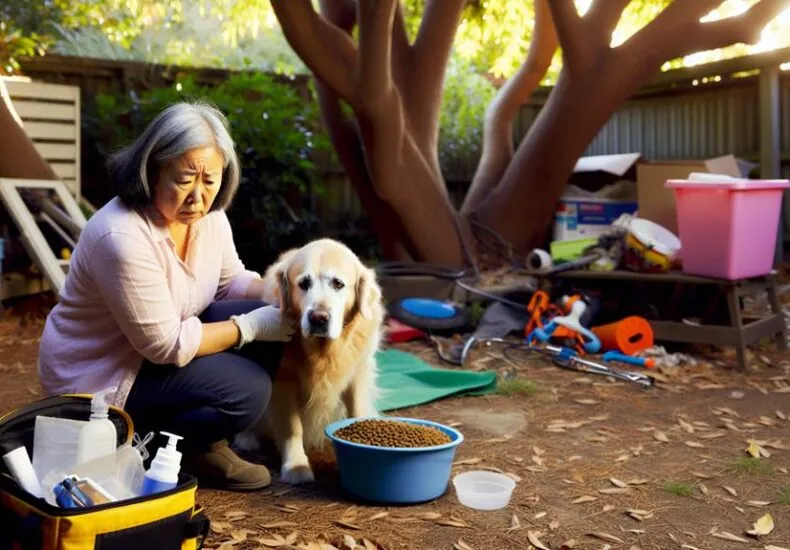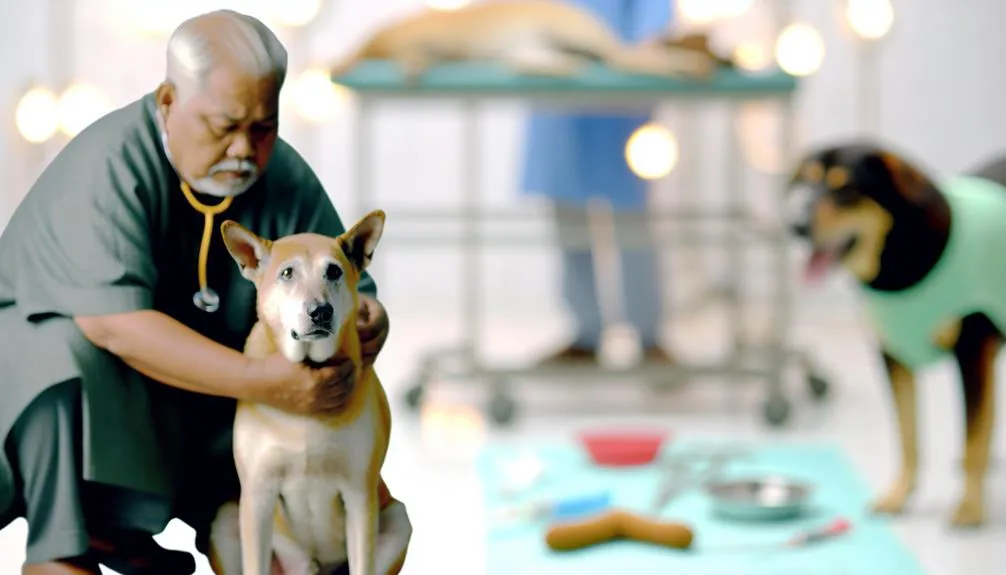
Why Does My Dog Have Diarrhea
You might've noticed your dog suddenly had a bout of diarrhea after a weekend of trying out a new treat. This change in their stool can be concerning, and it often raises questions about what could be causing it. While dietary changes are a common culprit, there are other factors at play that can lead to gastrointestinal upset. Understanding these potential causes can help you address the issue effectively, but it's essential to know when the situation warrants a closer look. What are the signs you should watch for?
Common Dietary Causes
When considering the common dietary causes of dog diarrhea, it's important to recognize that abrupt changes in diet can greatly disrupt a dog's gastrointestinal system. Sudden shifts from one food to another can lead to an imbalance in gut flora, resulting in loose stools or diarrhea. Maintaining a consistent diet helps preserve the integrity of the digestive system, as it allows for the gradual adaptation of the microbiota to the nutritional components present in the food.
Dietary fibers play an essential role in canine digestion. Soluble fibers, such as those found in oats and apples, can help absorb excess water in the intestines, thereby firming up stools. Conversely, insoluble fibers, like those in wheat bran, promote regular bowel movements by adding bulk. An insufficient intake of dietary fibers may contribute to gastrointestinal disturbances, including diarrhea.
Incorporating probiotics into a dog's diet can also provide significant benefits. Probiotics are live microorganisms that, when administered in adequate amounts, confer health benefits on the host. They can help restore the natural balance of gut bacteria following disturbances from dietary changes or infections, thereby potentially alleviating diarrhea. Including probiotic-rich foods or supplements in your dog's regimen can enhance their overall digestive health.
Food Allergies and Intolerances
Food Allergies and intolerances can greatly impact your dog's gastrointestinal health, often leading to diarrhea. Common allergens include proteins like beef, chicken, and dairy, which may provoke adverse reactions. Identifying these intolerances requires careful observation of your dog's diet and symptoms, often necessitating an elimination diet for accurate diagnosis.
Common Food Allergens
Identifying common food allergens is vital for managing dog diarrhea related to food Allergies and intolerances. Many dogs can develop ingredient sensitivities, which may manifest as gastrointestinal distress. Recognizing these allergens can help you avoid specific foods that may exacerbate your dog's condition.
Common food allergens in dogs include:
- Beef: A frequent culprit, beef Allergies can lead to diarrhea and other gastrointestinal issues.
- Dairy: Lactose intolerance is prevalent in dogs, leading to digestive upset when dairy products are consumed.
- Chicken: Like beef, chicken is a common protein source that can trigger Allergic reactions.
It's also important to take into account that some dogs may have seasonal Allergies that can compound gastrointestinal symptoms. While these reactions are not directly tied to food, they can complicate the overall health of your dog, potentially making them more sensitive to certain ingredients.
Understanding these common allergens can guide you in selecting appropriate diets and avoiding potential triggers. If your dog continues to experience diarrhea despite dietary changes, consulting with a veterinarian is vital for further evaluation and management.
Identifying Food Intolerances
Recognizing food intolerances in dogs is vital for effective management of gastrointestinal issues such as diarrhea. Food intolerances can lead to adverse reactions that mimic Allergies but generally do not involve the immune system. These intolerances often arise due to the dog's inability to digest certain ingredients, resulting in digestive distress.
To identify food intolerances, it's important to observe your dog's reactions to specific foods. Keep a detailed diary of their diet and any symptoms, noting behavioral triggers and environmental factors that may coincide with gastrointestinal disturbances. For example, did diarrhea occur after introducing a new protein source or grain? Changes in diet should be gradual, allowing your dog's system to adjust and helping to pinpoint potential issues.
A veterinarian may recommend an elimination diet, systematically removing suspected ingredients to monitor for improvements. If symptoms persist despite dietary changes, further diagnostic testing may be necessary. Understanding the interplay between food intolerances and your dog's overall health can greatly enhance their quality of life and reduce the incidence of diarrhea. Your proactive approach in identifying food intolerances can lead to more effective management strategies tailored to your pet's needs.
Infections and Parasites

When dealing with dog diarrhea, infections and parasites are significant culprits that can lead to gastrointestinal distress. Various pathogens can compromise your dog's digestive system, causing symptoms that warrant Immediate attention. Understanding these infections is vital for effective management and treatment.
Common infections include:
- Bacterial infections: Pathogens like Salmonella or E. coli can disrupt normal gut flora, resulting in diarrhea.
- Viral infections: Canine distemper can manifest with gastrointestinal symptoms, potentially leading to severe complications.
- Intestinal parasites: These include protozoan infections such as giardia and coccidia, which can severely affect your dog's health.
In addition to these, kennel cough, although primarily a respiratory issue, can sometimes present with gastrointestinal symptoms. When your dog is infected, the body may react by expelling toxins and pathogens through diarrhea. Protozoan infections like Giardia infection often result in watery stools and can be transmitted through contaminated water sources. Coccidia infection, on the other hand, may cause more severe diarrhea, particularly in puppies or immunocompromised dogs.
It's essential to consult your veterinarian if you suspect your dog has any of these infections. Diagnostic tests, including fecal examinations and blood work, can determine the underlying cause. Early intervention can prevent further complications and promote quicker recovery for your canine companion.
Sudden Dietary Changes
When you introduce new food ingredients to your dog's diet, it's vital to understand that sudden changes can lead to gastrointestinal upset, including diarrhea. A gradual shift period is essential to allow your dog's digestive system to adapt to the new formulation. By following this approach, you can minimize the risk of adverse reactions and maintain your pet's digestive health.
New Food Ingredients
Sudden dietary changes can greatly impact a dog's digestive system, often leading to diarrhea. Introducing new food abruptly can result in ingredient sensitivity or digestive upset due to a lack of acclimatization. It's essential to take into account the nutritional balance and ingredient quality of the new food, as low-quality ingredients or excessive flavor additives can exacerbate gastrointestinal issues.
When changing your dog's diet, keep these points in mind:
- Gradual Introduction: Slowly incorporate the new food over several days to allow your dog's digestive system to adjust.
- Monitor Ingredient Sensitivity: Be vigilant for any signs of intolerance or Allergies that may arise with new ingredients.
- Evaluate Feeding Practices: Review your feeding practices to guarantee that they align with your dog's specific dietary needs.
Transition Period Importance
Understanding the importance of a shift period is essential for maintaining your dog's digestive health during dietary changes. When you introduce a new food suddenly, it can disrupt your pet's gastrointestinal system, leading to issues like diarrhea. A changeover period allows your dog's digestive tract to adapt to new ingredients gradually, minimizing stress on their system.
To implement an effective changeover, begin by mixing a small amount of the new food with the current diet. Over the course of about 7 to 10 days, gradually increase the proportion of the new food while decreasing the old. This methodical approach to dietary adjustments helps prevent gastrointestinal upset by allowing beneficial gut bacteria to adjust accordingly.
Research indicates that abrupt dietary changes can lead to imbalances in gut flora and digestive enzymes, contributing to diarrhea and other digestive disturbances. By adhering to a structured shift period, you're not only promoting ideal digestion but also reducing the risk of dietary intolerances. As a result, always prioritize this essential step when changing your dog's food to guarantee a smoother, healthier changeover.
Stress and Anxiety Factors

Experiencing stress and Anxiety can greatly impact a dog's gastrointestinal health, often leading to diarrhea. Dogs are sensitive creatures, and their digestive systems can react negatively to various stressors. It's vital to recognize that environmental changes and behavioral triggers can markedly influence your dog's mental state, which in turn may result in gastrointestinal disturbances.
Common stressors that may provoke Anxiety and diarrhea in your dog include:
- Environmental Changes: Relocation, new family members, or changes in routine can upset your dog's sense of security.
- Behavioral Triggers: Loud noises, unfamiliar situations, or the presence of other animals can induce stress responses.
- Separation Anxiety: Leaving your dog alone for extended periods can lead to Anxiety, which may manifest as diarrhea.
When your dog encounters stress, the body releases hormones like cortisol, which can disrupt normal digestive functions. This disruption can lead to increased motility in the intestines, resulting in diarrhea. In addition, chronic stress can affect the gut microbiome, further complicating gastrointestinal health.
To mitigate these issues, it's important to establish a stable environment for your dog. Providing a consistent routine, employing calming techniques, and ensuring a safe space can help reduce Anxiety levels. If diarrhea persists despite addressing stress factors, consult with a veterinarian to discuss potential underlying issues. Understanding and managing stress in your dog is key to maintaining its digestive health and overall well-being.
Underlying Health Conditions
Underlying health conditions can greatly contribute to diarrhea in dogs, often requiring careful evaluation and intervention. Various gastrointestinal disorders, including infections, parasites, and systemic diseases, can lead to considerable digestive disturbances. For instance, conditions like pancreatitis or liver disease can disrupt the normal functioning of the gastrointestinal system, resulting in diarrhea as a prominent symptom.
One of the more complex issues is inflammatory bowel disease (IBD), which involves chronic inflammation of the gastrointestinal tract. IBD can manifest as recurrent diarrhea, weight loss, and vomiting. This condition is often challenging to diagnose, requiring a combination of clinical evaluation, diagnostic imaging, and potentially endoscopic biopsies to confirm the presence of inflammation and rule out other disorders.
Furthermore, food Allergies or sensitivities can also lead to gastrointestinal disturbances, including diarrhea. When a dog's immune system reacts adversely to specific proteins, it can result in inflammation of the intestinal lining, exacerbating symptoms. In some cases, underlying metabolic conditions, such as hyperthyroidism or diabetes, can indirectly affect gastrointestinal health, leading to increased frequency and urgency of bowel movements.
Ultimately, understanding the interplay between these underlying health conditions and diarrhea is essential. A thorough history, clinical examination, and appropriate diagnostic tests can help pinpoint the underlying issue. Early identification and targeted treatment can considerably improve your dog's overall health and well-being, addressing not just the diarrhea but the root cause behind it.
When to See a Vet

Recognizing when to seek veterinary care for your dog experiencing diarrhea is important, especially considering the potential underlying health conditions that may be at play. While occasional diarrhea can be benign, several factors necessitate immediate veterinary attention. It's important to assess the symptom severity and your dog's overall condition.
You should consider visiting a veterinarian if your dog exhibits any of the following:
- Diarrhea lasting more than 24 hours
- Presence of blood or mucus in the stool
- Signs of dehydration, such as Excessive thirst, lethargy, or dry gums
If your dog's diarrhea is accompanied by other symptoms—such as vomiting, Loss of appetite, or abdominal pain—it's critical to consult a vet promptly. These symptoms could indicate a more severe condition requiring immediate intervention. Additionally, if your dog is very young, elderly, or has pre-existing Health issues, the risk associated with diarrhea increases, making veterinary consultation necessary.
Your vet can provide appropriate Treatment options based on a thorough examination and diagnostic tests. Depending on the underlying cause, treatment may involve dietary changes, medications, or even more intensive care. It's important not to delay seeking help, as timely intervention can greatly affect your dog's recovery and overall health. Remember, when in doubt, it's always better to err on the side of caution and consult a professional.
Frequently Asked Questions
Can Certain Dog Breeds Be More Prone to Diarrhea?
Certain dog breeds can indeed exhibit breed sensitivity, making them more susceptible to gastrointestinal issues. Dietary factors also play a critical role, as specific ingredients may trigger diarrhea in predisposed breeds. Always consult your veterinarian for tailored advice.
Is Diarrhea Normal After My Dog Gets Vaccinated?
After vaccination, it's not uncommon for dogs to experience mild Side effects, including diarrhea. Post vaccine care is essential; monitor your dog closely. If diarrhea persists, consult your veterinarian for further assessment and guidance.
How Long Can a Dog Have Diarrhea Before It's Serious?
If your dog's diarrhea persists for more than 24 hours, it could indicate underlying issues. Common diarrhea causes include infections or dietary changes. Seeking veterinary advice for Treatment options is essential to prevent complications.
Can Medications Cause Diarrhea in Dogs?
Medications can indeed impact your dog's digestive health, causing diarrhea as a side effect. While some treatments are vital, they may disrupt gut flora, leading to gastrointestinal upset. Monitoring is critical to guarantee your dog's well-being.
Are There Home Remedies for Dog Diarrhea?
Yes, there're home remedies for dog diarrhea. Probiotic supplements can restore gut flora, while dietary adjustments, like bland diets, help ease digestive distress. Always consult your vet before starting any treatment for best results.
Conclusion
In summary, steering through the turbulent waters of your dog's digestive health requires vigilance and understanding. Whether it's the sudden shift of a stormy diet or the hidden shadows of stress, recognizing the signs can make all the difference. If diarrhea lingers like a dark cloud or is accompanied by alarming symptoms, it's essential to seek veterinary guidance. Your proactive approach guarantees your furry companion finds their way back to calm, healthy shores, free from the discomfort of gastrointestinal distress.
You may also like
Archives
Calendar
| M | T | W | T | F | S | S |
|---|---|---|---|---|---|---|
| 1 | 2 | 3 | 4 | 5 | 6 | |
| 7 | 8 | 9 | 10 | 11 | 12 | 13 |
| 14 | 15 | 16 | 17 | 18 | 19 | 20 |
| 21 | 22 | 23 | 24 | 25 | 26 | 27 |
| 28 | 29 | 30 | ||||
Leave a Reply